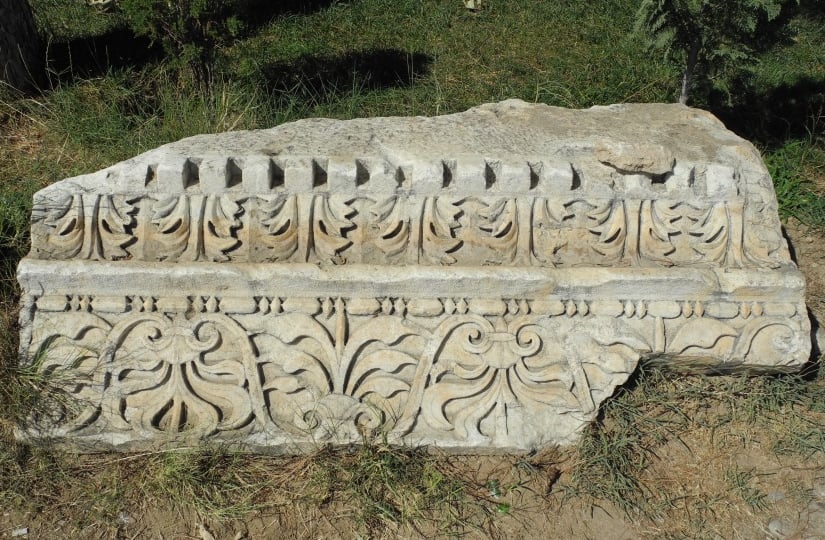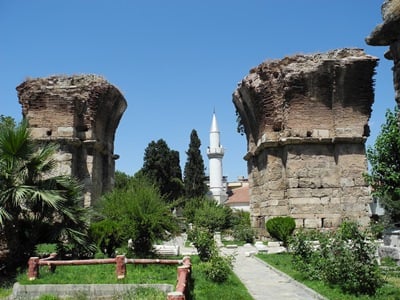Christ’s message to Philadelphia in Revelation 3 was quite different from the messages to the other churches. What is the significance of this message?

The cornice from a building in ancient Philadelphia (photo by Joel Meeker).
Philadelphia was the sixth of seven congregations to receive a message from Jesus Christ at the end of the first century. For an overview of the messages to all seven congregations, see “Seven Churches of Revelation.”
Members of the Church of God in Philadelphia undoubtedly faced similar influences and pressures as did other Christians at the time. Yet the nature of Christ’s message to this church did not include correction. It only offered encouragement and promises.
Before considering the significance of this message, this article will provide a short history of the city. Then it will explain the meaning of the message and its importance today.
History of Philadelphia
Located in modern Turkey on the Cogamus River about 105 miles east of Smyrna and 25 miles southeast of Sardis, Philadelphia was founded later than many of the other cities of Asia Minor. Sometime after 189 B.C. it was established on one of the highways leading to the interior of the region.
Philadelphia means brotherly love. “Its name was given to it in honor of Attalus II, because of his loyalty to his elder brother, Eumenes II, king of Lydia. Still another name of the city was Decapolis, because it was considered as one of the ten cities of the plain. A third name which it bore during the 1st century AD was Neo-kaisaria; it appears upon the coins struck during that period. During the reign of Vespasian, it was called Flavia.
“Its modern name, Ala-shehir, is considered by some to be a corruption of the Turkish words Allah-shehir, ‘the city of God,’ but more likely it is a name given it from the reddish color of the soil. In addition to all of these names it sometimes bore the title of ‘Little Athens’ because of the magnificence of the temples and other public buildings which adorned it.
“Philadelphia quickly became an important and wealthy trade center, for as the coast cities declined, it grew in power, and retained its importance even until late Byzantine times” (International Standard Bible Encyclopedia, 1939, “Philadelphia”).
Like the other cities in Asia Minor, it often had to be rebuilt due to earthquakes. Roman emperors often helped rebuild these cities; and in the early part of the first century, the famous historian from the area, Strabo, specifically wrote of the walls of the houses in Philadelphia being cracked due to earthquakes (Strabo’s Life and Works).
A few ruins, including cornices of buildings, a portion of a wall and the foundations of churches dating throughout the centuries, are still visible today.
The message
“And to the angel of the church in Philadelphia write, ‘These things says He who is holy, He who is true, “He who has the key of David, He who opens and no one shuts, and shuts and no one opens”: “I know your works. See, I have set before you an open door, and no one can shut it; for you have a little strength, have kept My word, and have not denied My name.
“Indeed I will make those of the synagogue of Satan, who say they are Jews and are not, but lie—indeed I will make them come and worship before your feet, and to know that I have loved you. Because you have kept My command to persevere, I also will keep you from the hour of trial which shall come upon the whole world, to test those who dwell on the earth.
“Behold, I am coming quickly! Hold fast what you have, that no one may take your crown. He who overcomes, I will make him a pillar in the temple of My God, and he shall go out no more. I will write on him the name of My God and the name of the city of My God, the New Jerusalem, which comes down out of heaven from My God. And I will write on him My new name. He who has an ear, let him hear what the Spirit says to the churches”’” (Revelation 3:7-13, emphasis added throughout).
The explanation
The message to Philadelphia begins with an announcement from Christ that He has “the key of David” and that what He opens “no one shuts” and what He shuts “no one opens” (Revelation 3:7).
This statement is similar to Isaiah 22:20-22 where Eliakim is given the key of the house of David: “So he shall open, and no one shall shut; and he shall shut, and no one shall open.” Eliakim had the authority to control who had access to David’s house.
Christ’s statement that He had “the key of David” reveals two important points:
- First, as prophesied, Christ had received “the throne of His father David” (Luke 1:32).
- Second, Christ had the authority to open and close doors for the benefit of the congregation at Philadelphia. When Christ opened or closed these doors, no one could reverse these actions.
As for how Christ used His authority to open or close doors, He next tells the church at Philadelphia that He knows their works and that He has set before them “an open door, and no one can shut it; for you have a little strength, have kept My word, and have not denied My name” (verse 8).
An open door to preach the gospel
Several New Testament passages show that “an open door” referred to the opportunity to preach the gospel of the Kingdom. One example of this is found in Acts 14:27 where Paul reported to the church at Antioch that God “had opened the door of faith to the Gentiles” (also see 1 Corinthians 16:9; 2 Corinthians 2:12; Colossians 4:3).
Ruins of a Byzantine Church at Philadelphia (photo by Joel Meeker).
The synagogue of Satan
Next, Jesus says that He will make “those of the synagogue of Satan, who say they are Jews and are not” worship before the feet of the members at Philadelphia and recognize that Christ has loved them (Revelation 3:9). While it is clear that Jesus is making “those of the synagogue of Satan” understand that He loves and respects the members of the church of Philadelphia, it is not as clear who these people are who are part of the synagogue of Satan.
This reference to people falsely claiming to be Jews is similar to Christ’s words to Smyrna: “I know the blasphemy of those who say they are Jews and are not, but are a synagogue of Satan” (Revelation 2:9). As was noted in the article on Smyrna, the meaning of people falsely claiming to be Jews could be a reference to people falsely claiming to be Christians.
As Paul explains, all Christians, regardless of their racial background, are considered Jews: “For he is not a Jew who is one outwardly, nor is circumcision that which is outward in the flesh; but he is a Jew who is one inwardly; and circumcision is that of the heart, in the Spirit, not in the letter; whose praise is not from men but from God” (Romans 2:28-29).
The point behind Christ’s action toward those labeled as the “synagogue of Satan” is to show them and others whom He loves and respects. As has already been documented in this series of articles on the seven churches of Revelation, the Church of God founded by Jesus and the apostles faced much persecution through the centuries.
This persecution came from the Roman government, from Jews who practiced Judaism and from people who claimed to be Christian yet who did not diligently adhere to the teachings of Christ and the apostles. (The article on Smyrna documents the struggle faithful Christians had during the second century with others claiming to also be Christian who had mistakenly abandoned the observance of Passover for Easter.)
The hour of trial
Because the members at Philadelphia kept Christ’s command to persevere, He promises that they will be kept from “the hour of trial which shall come upon the whole world” (Revelation 3:10). While some have looked for a historical fulfillment of this time of trial, such as a particularly severe persecution by a Roman emperor, the primary meaning of this phrase is the difficult conditions that will exist at the end of this age just before Christ’s return.
Explaining to His disciples what conditions would be like for His faithful people when He comes again, Jesus said, “Then they will deliver you up to tribulation and kill you, and you will be hated by all nations for My name’s sake. And then many will be offended, will betray one another, and will hate one another” (Matthew 24:9-10).
Later in the same chapter He added: “For then there will be great tribulation, such as has not been since the beginning of the world until this time, no, nor ever shall be. And unless those days were shortened, no flesh would be saved; but for the elect’s sake those days will be shortened” (verses 21-22).
When we bear in mind that the chronological development of the Church is one of the ways the messages to the seven churches can be understood, it becomes apparent that “the hour of trial” represents the Great Tribulation that will occur just before Christ’s second coming. For further explanation of the Church’s historical development, see “Seven Churches of Revelation.”
As the world teeters on the edge of self-destruction and faithful Christians are hated and even martyred, Christ promises protection for those in Philadelphia during this particularly bleak period of human history that will “test those who dwell on the earth” (Revelation 3:10).
As these awful events occur, Jesus admonishes the Philadelphians to hold fast to God’s way of life so no one will take their “crown” (verse 11)—their opportunity to receive eternal life and reign with Christ over the nations (Revelation 1:6; 2:26; 5:10).
Promises for overcomers
The message to this congregation concludes with important promises that Christ says He will give to those who overcome. These include the opportunity to be “a pillar in the temple of My God” and having God’s “new name” (Revelation 3:12).
The reference to being a pillar in God’s temple and the further explanation “he shall go out no more” (verse 12) was encouraging for Philadelphians who, due to earthquakes, may have seen the pillars of buildings in their city collapse and citizens having to go out of the buildings for safety. The new name that will identify Christians as belonging to God was surely more enticing than the various name changes the city of Philadelphia had experienced.
Lessons for us
Although there is no correction offered by Christ to the church in Philadelphia, there is still important advice in this message that applies to us. What pleased Christ about this church was that its members had persevered in the face of pressures to abandon God’s instructions. Instead of denying God’s name, they had remained faithful and apparently preached the gospel as God opened doors for them to do so.
Christ advised these faithful members to “hold fast what you have” (verse 11), meaning they should continue in this path. He also reminded them that He will reward those who overcome (verse 12, also see Revelation 2:7, 11, 17, 26; 3:5, 21). An important lesson for us is that once we begin obeying God and living as He commands, we must stay the course.
If you would like to learn more about how to please God, the articles in the “Change” section of this website provide excellent guidance.





